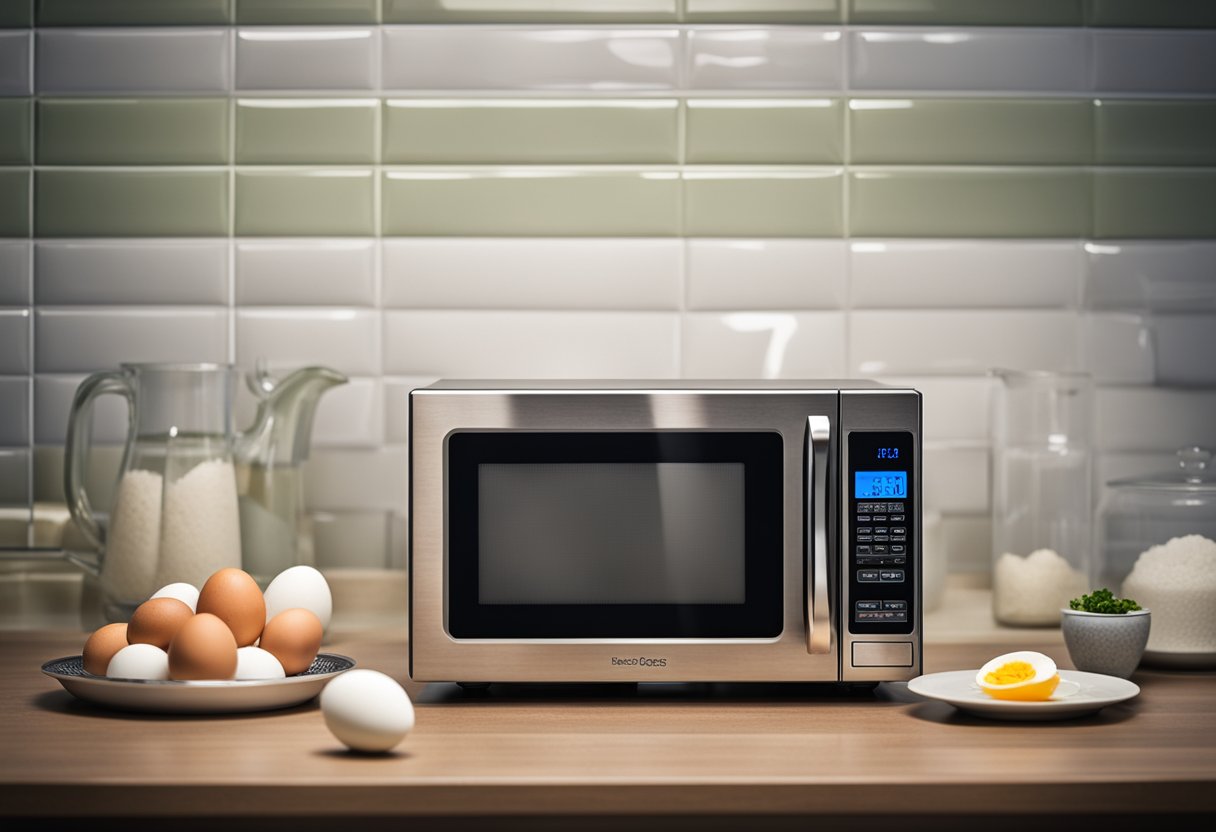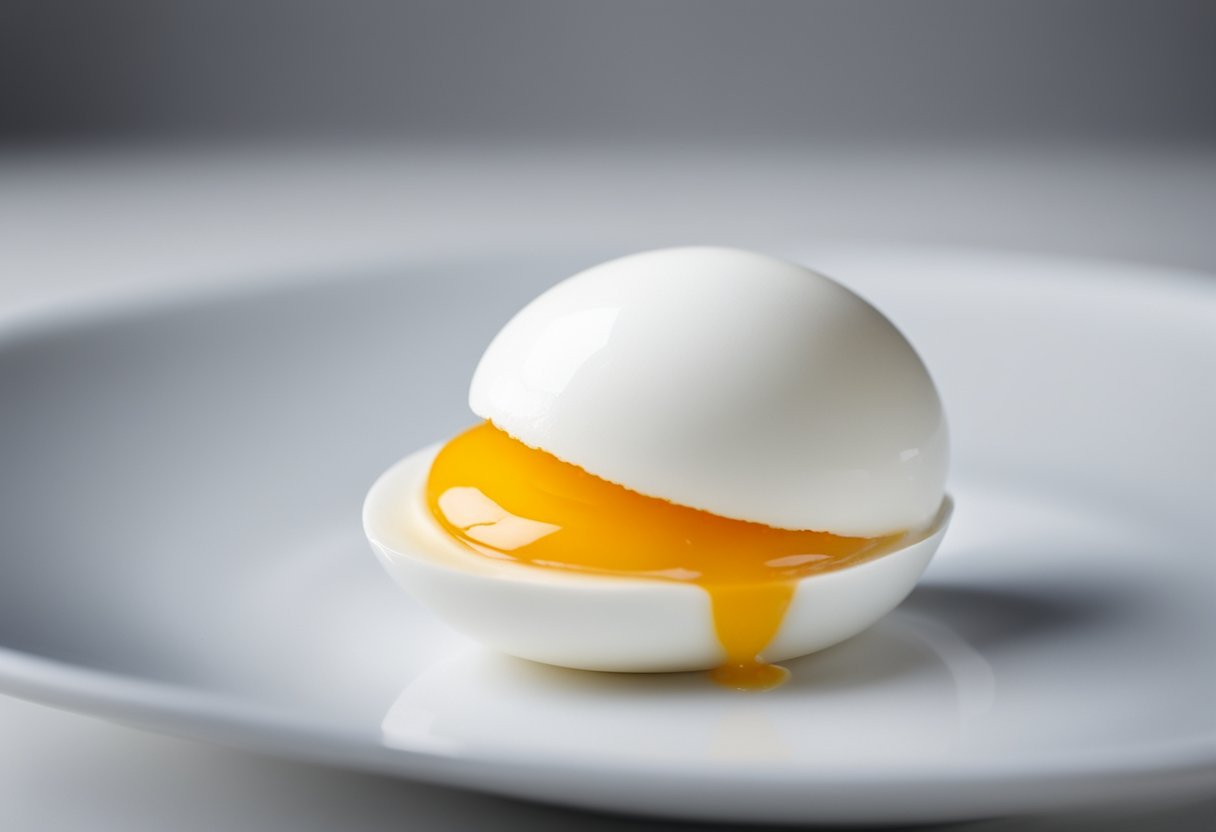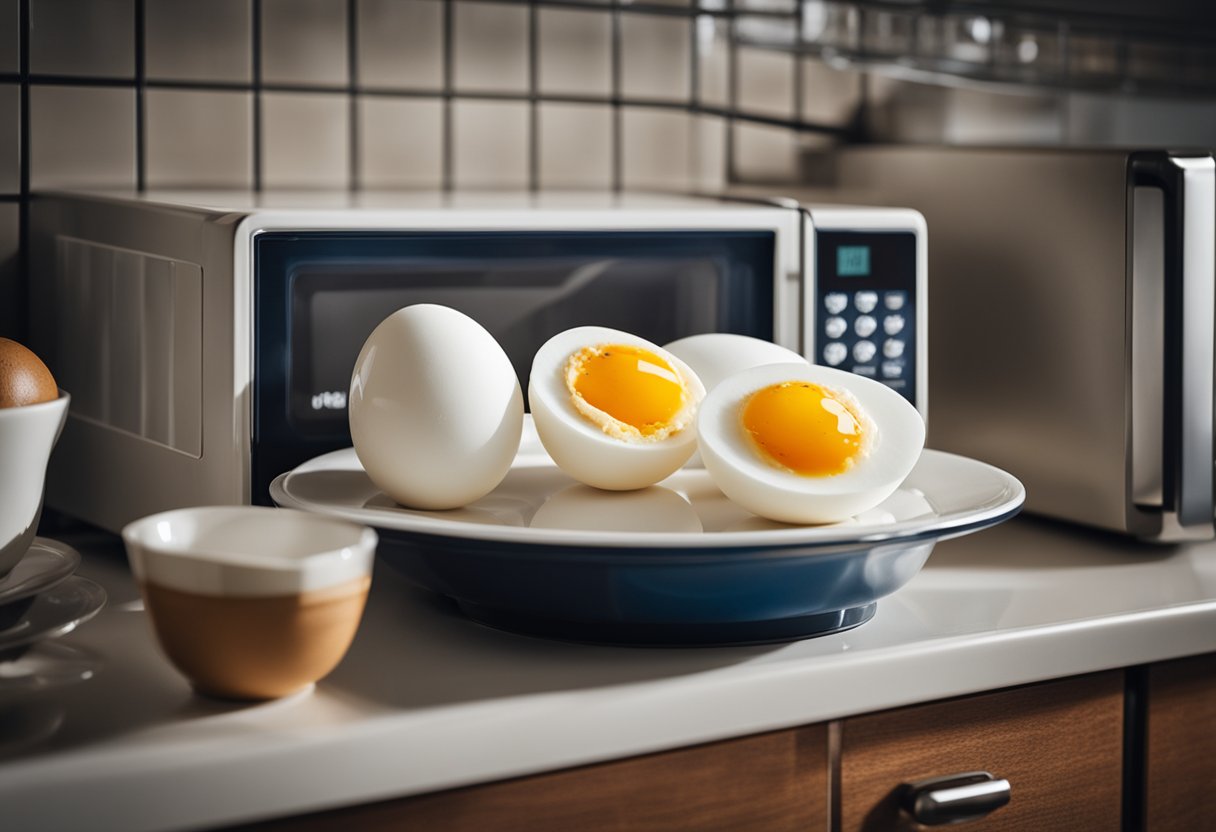Can boiled eggs be reheated? This is a common question among egg lovers who often find themselves with leftover boiled eggs.
While reheating eggs may seem like a simple task, there are several factors to consider to ensure that the eggs are safe to eat and retain their quality.
In this article, I will explore the basics of reheating boiled eggs, the different methods you can use, the potential risks involved, and how to safely incorporate reheated eggs into your meals.

When it comes to reheating boiled eggs, it’s important to understand the basics. Boiled eggs are a great source of protein and other essential nutrients, but they can spoil quickly if not stored properly.
Reheating boiled eggs can also be tricky, as overcooking or undercooking them can affect their texture, flavor, and nutritional value.
Additionally, reheating eggs improperly can lead to foodborne illnesses, which can be dangerous, especially for pregnant women, young children, and people with weakened immune systems.
To ensure that you reheat boiled eggs safely and effectively, there are certain measures you need to take. These include proper storage and handling of leftover eggs, using the right reheating method, and following food safety guidelines.
By doing so, you can enjoy the convenience of reheating boiled eggs without compromising on taste, quality, or safety.
Key Takeaways
- Reheating boiled eggs requires proper storage and handling to prevent spoilage and foodborne illnesses.
- Using the right reheating method and following food safety guidelines can help retain the quality and nutritional value of boiled eggs.
- Incorporating reheated eggs into meals can be a convenient and healthy way to enjoy this protein-rich food.
Understanding Reheating Basics
When it comes to reheating boiled eggs, there are a few basics that you should keep in mind to ensure that your eggs are safe to eat and taste great. Here are some key points to consider:
Reheating Methods
There are several methods that you can use to reheat boiled eggs, including the microwave, stovetop, and oven. Each method has its pros and cons, so it’s important to choose the method that works best for you.
- Microwave: This is the quickest and easiest way to reheat boiled eggs. Simply place the eggs in a heat-proof bowl, cover with a damp paper towel, and microwave on high for 30-60 seconds.
- Stovetop: This method takes a bit longer than the microwave, but it’s still relatively quick and easy. Fill a saucepan with enough water to cover the eggs, bring to a boil, then reduce the heat to low and simmer for 3-5 minutes.
- Oven: This method takes the longest, but it’s great if you’re reheating a large batch of eggs. Preheat your oven to 350°F, place the eggs in a baking dish, and bake for 10-15 minutes.
Temperature
To ensure that your boiled eggs are safe to eat, it’s important to reheat them to the right temperature. The USDA recommends reheating eggs to an internal temperature of at least 165°F.
You can use a food thermometer to check the temperature of your eggs.
Heat-Proof Bowl
When reheating eggs in the microwave or stovetop, it’s important to use a heat-proof bowl that can withstand high temperatures.
Glass or ceramic bowls are a good choice, but avoid using plastic or metal bowls, as they can melt or leach chemicals into your food.
Overall, reheating boiled eggs is a simple and easy process, as long as you follow these basic guidelines. By choosing the right reheating method, checking the temperature, and using a heat-proof bowl, you can enjoy delicious and safe boiled eggs every time.
Safety Measures While Reheating

As with any food, reheating boiled eggs requires careful attention to safety measures to prevent any potential hazards or foodborne illnesses. Here are some key safety measures to keep in mind:
1. Avoid Overheating
Overheating boiled eggs can cause them to explode, which can be dangerous. To prevent this, it’s crucial to avoid heating them in a microwave or on a stovetop for too long. Instead, it’s best to reheat boiled eggs slowly and gently.
2. Store Eggs Properly
Before reheating boiled eggs, it’s important to make sure they have been stored properly. Eggs should be stored in the refrigerator at a temperature of 40°F (4°C) or below.
If you’re unsure about the temperature, use a food thermometer to check.
3. Follow FDA Guidelines
The FDA recommends reheating eggs to an internal temperature of 165°F (74°C) to kill any potential bacteria, such as salmonella. It’s important to use a food thermometer to ensure that the eggs have reached this temperature.
4. Avoid Cross-Contamination
To prevent cross-contamination, it’s important to use clean utensils and surfaces when handling boiled eggs. If you’re reheating eggs in a microwave, use a microwave-safe container and cover it with a lid or plastic wrap. If you’re reheating eggs on a stovetop, use a pot or pan that has been cleaned and sanitized.
5. Be Aware of Food Safety
Safety is key when it comes to reheating boiled eggs. If you’re unsure whether your eggs are safe to eat, it’s best to err on the side of caution and discard them.
If you experience any symptoms of foodborne illness, such as nausea, vomiting, or diarrhea, seek medical attention immediately.
By following these safety measures, you can enjoy reheated boiled eggs safely and without any risk of foodborne illness.
Reheating Methods
When it comes to reheating hard boiled eggs, there are several methods you can use. Here are some of the most common ways to reheat eggs:
Using Microwave
Reheating hard boiled eggs in the microwave is quick and easy. Simply place the egg in a microwave-safe dish, cover it with a lid or plate, and microwave on high for 30 seconds.
If the egg is still cold, continue microwaving in 10-second intervals until it reaches the desired temperature. Be careful not to overheat the egg, as it can explode in the microwave.
Using Stovetop
To reheat hard boiled eggs on the stovetop, fill a saucepan with enough water to cover the eggs and bring it to a boil.
Gently place the eggs in the water and let them heat through for 1-2 minutes. Remove the eggs from the water with a slotted spoon and serve.
Using Oven
If you prefer to reheat your eggs in the oven, preheat it to 325°F (160°C). Place the eggs in a baking dish and cover with foil. Bake for 10-15 minutes, or until the eggs are heated through.
Dealing with Frozen Eggs
If you have frozen hard boiled eggs, you can still reheat them. To do so, place the frozen eggs in a steamer basket and steam for 15-20 minutes, or until they are heated through.
Alternatively, you can thaw the eggs in the refrigerator overnight and then reheat them using one of the methods above.
No matter which method you choose, be sure to handle the eggs carefully and avoid overcooking them. With a little bit of care, you can enjoy perfectly reheated hard boiled eggs in no time.
Effect of Reheating on Egg Properties
When it comes to reheating boiled eggs, there are a few things you should consider. The process of reheating can have an impact on the texture, flavor, and overall quality of the egg.
One of the most noticeable effects of reheating boiled eggs is the change in texture. The yolk can become dry and crumbly, while the white can become rubbery.
This is because the heat can cause the proteins in the egg to denature and coagulate, resulting in a less desirable texture.
In addition to texture, reheating can also affect the flavor and taste of the egg. The longer the egg is stored, the more likely it is to develop off-flavors.
When reheating, the egg can also absorb flavors from other foods in the microwave or oven, which can alter its taste.
Another factor to consider is moisture. When eggs are boiled, they lose some of their moisture content. Reheating can further reduce the moisture, resulting in a drier egg.
It is also important to note that the shell and peel can affect the reheating process. If the egg is not peeled before reheating, the shell can trap heat and cause the egg to overcook.
If the egg is peeled, it can lose moisture more quickly and become even drier.
Overall, reheating boiled eggs can have a negative impact on their properties.
While it is possible to reheat them, it is important to do so carefully and with the understanding that the texture, flavor, and moisture content may be affected.
Storing and Handling Leftover Eggs
When it comes to storing leftover eggs, it’s important to take proper precautions to prevent foodborne illness. Here are some tips to ensure that your leftover eggs stay safe to eat:
- Refrigerate promptly: Any leftover eggs or egg dishes should be refrigerated within 2 hours of cooking, or within 1 hour if the temperature is above 90°F. To allow for quick cooling, transfer the dish to a shallow, airtight container.
- Consume leftovers within 3 to 4 days: Discard any leftover older than that. Some bacteria may thrive and grow slowly in the fridge, so it’s best to err on the side of caution and not keep leftovers for too long.
- Store eggs in their original carton: According to the FDA, eggs should be stored in a refrigerator in their original carton and used within three weeks.
- Keep eggs separate from other foods: Make sure to store eggs away from other foods, especially those that are ready-to-eat. This will help prevent cross-contamination.
- Label and date leftovers: It’s a good idea to label and date your leftover eggs so you know when they were cooked and when they need to be consumed by.
By following these simple guidelines, you can help ensure that your leftover eggs stay safe to eat. Remember, when in doubt, throw it out!
Incorporating Reheated Eggs in Meals

When it comes to reheating boiled eggs, there are many options available for incorporating them into meals. Here are some ideas:
Breakfast
Hard-boiled eggs are a great addition to any breakfast meal. You can reheat them and serve them with toast, or chop them up and add them to a breakfast burrito or omelette.
If you’re looking for something quick and easy, you can also just grab a reheated egg and eat it on the go.
Recipes
Reheated eggs can be used in a variety of recipes. For example, you can make egg salad by mashing up boiled eggs and adding mayonnaise, mustard, and other seasonings.
You can also use reheated eggs in quiches or frittatas, or add them to a salad for a protein boost.
Deviled Eggs
Deviled eggs are a classic dish that can be made with reheated eggs. To make deviled eggs, simply cut boiled eggs in half, remove the yolks, and mix them with mayonnaise, mustard, and other seasonings. Then, spoon the mixture back into the egg whites and serve.
Scrambled Eggs
If you’re looking for a quick and easy breakfast option, you can reheat boiled eggs and scramble them with other ingredients like cheese, vegetables, or meat. This is a great way to use up leftovers and create a filling and nutritious meal.
My Recipes
If you’re looking for more inspiration, you can check out my recipes for ideas on how to use reheated eggs in meals. From egg salad sandwiches to quiches and more, there are plenty of delicious options to choose from.
Overall, reheated eggs are a versatile and nutritious ingredient that can be used in a variety of meals and recipes.
Whether you’re looking for a quick breakfast option or a filling lunch, there are many ways to incorporate reheated eggs into your diet.
Potential Risks and Precautions

As with any reheated food, there are potential risks associated with reheating boiled eggs. It is important to take precautions to ensure that the reheated eggs are safe to eat and do not pose any health risks.
One of the main risks associated with reheating boiled eggs is the potential for the eggs to explode. This is due to the buildup of pressure inside the egg as it is heated.
To avoid this, it is recommended that you do not reheat boiled eggs with their shell intact in a microwave. Instead, you can try submerging them in hot water for a few minutes to warm them up.
Another risk associated with reheating boiled eggs is the potential for bacteria growth and the risk of food-borne illnesses.
It is important to ensure that the eggs are thoroughly reheated to 165°F (74°C) before eating to kill any germs and reduce the risk of illness. Using a food thermometer can help ensure that the eggs have reached the appropriate temperature.
In addition to the risks associated with reheating boiled eggs, there are also precautions that should be taken to ensure that the reheated eggs are of good quality.
Reheated boiled eggs can become rubbery and lose their flavor if not reheated properly. To avoid this, it is recommended that you reheat the eggs slowly and avoid overheating them.
In summary, reheating boiled eggs can be done safely if proper precautions are taken. It is important to avoid reheating boiled eggs with their shell intact in a microwave to prevent the risk of explosion.
Additionally, it is important to ensure that the eggs are thoroughly reheated to 165°F (74°C) to kill any germs and reduce the risk of food-borne illnesses.
Finally, reheated boiled eggs can become rubbery and lose their flavor if not reheated properly, so it is important to reheat them slowly and avoid overheating.
Nutritional Impact of Reheating
As a nutritionist, I am often asked about the nutritional impact of reheating boiled eggs. While reheating eggs can alter their texture, there is no research to suggest that reheating previously cooked eggs affects anything other than their texture and taste.
Boiled eggs are an excellent source of high-quality protein, which is essential for building and repairing tissues in the body.
The protein in eggs contains all the essential amino acids that the body needs to function properly. Reheating boiled eggs does not affect the protein content of the eggs.
However, it is important to note that reheating boiled eggs can cause them to lose some of their nutritional value.
Overcooking or reheating eggs for too long can cause the yolks to become dry and rubbery, which can make them less palatable and less nutritious.
To preserve the nutritional value of boiled eggs when reheating, it is important to use the right method. One of the best ways to reheat boiled eggs is to place them in a pot of simmering water for about 5 minutes.
This slow and steady approach ensures even heating without overcooking and helps maintain the perfect texture.
In summary, reheating boiled eggs does not affect their nutritional value. However, it is important to use the right method to preserve their flavor and texture.
Boiled eggs are an excellent source of high-quality protein and should be included in a healthy and balanced diet.
Conclusion

In conclusion, reheating boiled eggs is possible and safe if done correctly. Whether you prefer to use boiling water or a microwave, both methods can be used to reheat boiled eggs.
However, the safest way to reheat boiled eggs is by using boiling water.
It is important to note that reheating boiled eggs too many times can cause them to spoil and increase the risk of food poisoning. Therefore, it is recommended to only reheat boiled eggs once.
When reheating boiled eggs, it is important to follow some basic guidelines to ensure that they are heated evenly and thoroughly.
For example, it is recommended to remove the eggs from the refrigerator and let them come to room temperature before reheating. This will help to prevent them from cracking during the reheating process.
In terms of versatility, boiled eggs can be used in a variety of dishes and can be reheated to add protein to a meal or snack. They are also a great pantry and larder staple, as they can be stored in the refrigerator for up to a week.
In summary, reheating boiled eggs is a simple process that can be done safely and easily. By following some basic tips and guidelines, you can enjoy the many benefits of boiled eggs in a variety of dishes.
Related post: Can You Reboil Eggs
Frequently Asked Questions
How long can boiled eggs be reheated?
Boiled eggs can be reheated within 2 hours of cooking. After this time, it is not safe to eat them.
Can boiled eggs be reheated overnight?
No, it is not recommended to reheat boiled eggs overnight. It is best to refrigerate them and reheat them within 2 hours of cooking.
Can boiled eggs be reheated in the oven?
Yes, boiled eggs can be reheated in the oven. Place them in a preheated oven at 350°F (180°C) for around 10 minutes.
Can boiled eggs be reheated in the microwave?
Yes, boiled eggs can be reheated in the microwave. Heat them at 50% power for 60-90 seconds.
Can you eat cold boiled eggs?
Yes, you can eat cold boiled eggs. They are a popular ingredient in salads and sandwiches.
Is it safe to reheat cooked eggs?
Yes, it is safe to reheat cooked eggs if they are reheated to an internal temperature of 165°F (74°C) to kill any germs and reduce the risk of illness.







